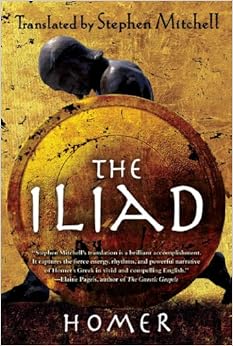I don’t know why I have waited to this point in my life to
read the Greek classic The Iliad. I think, if I’m honest, I was intimidated by it – by its reputation. I’m a relatively bright fellow, but somewhere along the way I convinced myself that the epic poem was beyond me. Putting all that aside, I recently decided to challenge myself to finally read it. And I have really enjoyed reading it.
I am, of course, reading it in an English translation; I am still a bilingual illiterate (I can’t read in two languages – one of which is Homeric Greek.) I found Stephen Mitchell’s translation at my local public library. It is a vibrant and swift moving translation, not at all dull and stodgy like I had fearfully imagined it would be.
The Iliad is about
honor. Its setting is the 10 year long
siege of Troy, but the story itself is about honor, and the powerful motivating
force of besmirched honor. Menelaus and
Agamemnon launch a thousand ships to war against Troy because of Prince Paris’
dishonorable actions. The great warrior,
Achilles, sulks in his tent while other men around him are dying in battle
because of a slight to his honor by Agamemnon.
Honor – and the perception of honor – is what drives the characters in
this story; they throw themselves into heroic conflict to achieve greatness and
to defend their reputations and the honor of their families, and homes.
Take that away and it all seems rather petty. A 10 year war because Helen ran away with
Paris? Achilles refuses to join the rest
of the Greeks because Agamemnon took away his prize? The reader must be prepared to set aside
modern conventions and to read the story in its own setting.
One detail that struck me (and often) was the armor stripping. Every time a hero (either Greek or Trojan) killed an enemy, he made a great show of stripping the armor from his defeated foe, and sometimes of desecrating the corpse (as Achilles did to Hector’s corpse by dragging it behind his chariot for several days). This act would shame his opponent and make the victory all the more glorious (or the defeat all the more shameful for the family and friends of the defeated).
One detail that struck me (and often) was the armor stripping. Every time a hero (either Greek or Trojan) killed an enemy, he made a great show of stripping the armor from his defeated foe, and sometimes of desecrating the corpse (as Achilles did to Hector’s corpse by dragging it behind his chariot for several days). This act would shame his opponent and make the victory all the more glorious (or the defeat all the more shameful for the family and friends of the defeated).
Having spent much of my life reading and studying the Bible,
I was curious to see how this Greek classic would compare to that great book
(that great collection of books.) The Iliad is attributed to Homer and said
to have been written in the 8th century BCE – though the events that
it describes occurred (whatever one thinks of its historicity) in the 12th
century BCE – some four hundred years earlier.
That would compare, roughly, to a work written during the time of the Biblical kings and prophets concerning heroes during the time of the Judges (roughly). There are a few brief flashes of similarity – I think mainly of Samson’s final prayer for his strength to be restored so that he might die an honorable death killing Philistines – but stylistically and conceptually the works are worlds apart.
That would compare, roughly, to a work written during the time of the Biblical kings and prophets concerning heroes during the time of the Judges (roughly). There are a few brief flashes of similarity – I think mainly of Samson’s final prayer for his strength to be restored so that he might die an honorable death killing Philistines – but stylistically and conceptually the works are worlds apart.
The gods and goddesses of The Iliad are competitive amongst themselves and capricious in
their interventions into the affairs of humans.
They are constantly flicking arrows away from their favorite soldiers,
or blocking spears, or whisking wounded men away from battle. It’s almost a wonder that the people of
ancient Greece could get anything done with the constant meddling from Mount
Olympus. By way of contrast, the god of
the Bible is comparatively restrained in his interruption of human
affairs. He does intervene, and
miraculously, but Yahweh’s a hermetic recluse when compared to the Greek
deities.
If you’re like me – somewhat intimidated by this classic of
western civilization – take courage. Be
strong and noble; read the story of great men doing mighty things. Plunge
yourself into a strange world where honor is praised above all else, where
death is glorious on the field of battle, and the gods are fickle.
I'm going to go on now and read The Odyssey (also by Homer) and The Aeneid (by Virgil) which are both sequels of a sort to The Iliad. Homer's Odyssey follows Odysseus on his 10 year journey home after the end of the Trojan War, while Virgil's Aeneid tells of Aeneus' survival after the fall of Troy and his wanderings before becoming the ancestor of the Romans.
Homer. The Iliad. Trans. Stephen Mitchell. New York,
NY. Free Press. 2011.





No comments:
Post a Comment